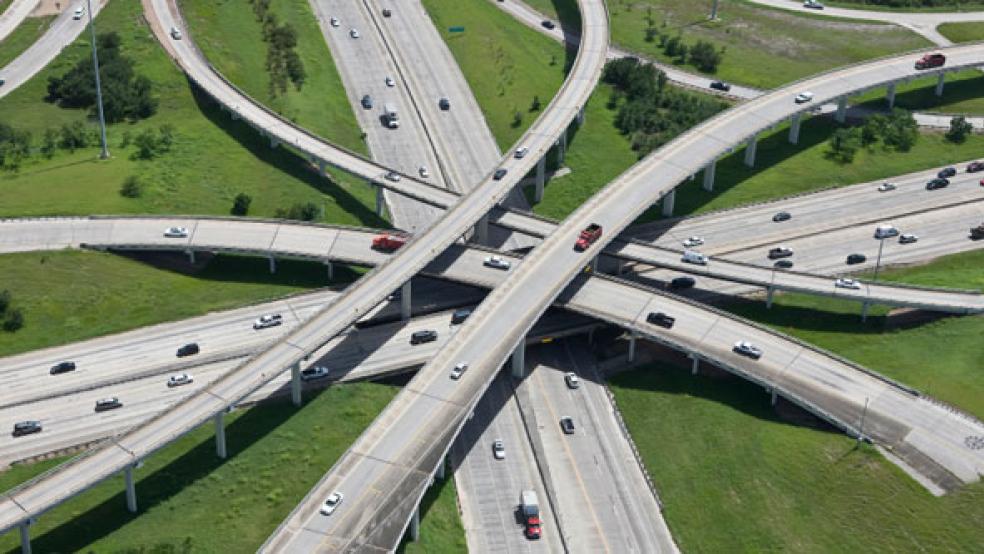The nation’s governors on Tuesday joined President Obama in urging Congress to boost spending this year on highway, bridges, power grids and other infrastructure to meet the growing demand and help keep the economic recovery alive.
“To be frank, too little federal investment in infrastructure is handicapping U.S. business in global markets,” Colorado Gov. John Hickenlooper, chair of the National Governors Association, said during the NGA’s third annual “State of the States” address at the National Press Club in Washington, D.C. “What was new 65 years ago now has to be rebuilt or repaired. . . Governors know that you can’t build a competitive economy without the foundation provided by modernized infrastructure.”
Related: Obama Says China’s Infrastructure Puts the U.S. to Shame
Hickenlooper, a Democrat, and Gov. Gary Herbert of Utah, a Republican, echoed the concerns of the president, who warned recently that China and other global competitors are outpacing the U.S. in investing in critical infrastructure. “It makes no sense that we have a first class economy with a second class infrastructure,” Obama told the Business Roundtable about a month ago.
WHY THIS MATTERS
The nation’s governors, including a dozen newly elected chief executives, warn of dire consequences for business and the economy unless Congress renews its support for an ambitious new transportation and infrastructure program.
Hickenlooper said states are doing the best they can to increase funding in the absence of a renewed commitment by Congress to fully fund the federal Highway Trust Fund and authorize a new long-term transportation and infrastructure spending plan.
In fiscal 2014, transportation spending overall grew by more than four percent. State funds increased more than 10 percent while federal funds dropped by more than one percent, according to NGA figures.
“If Congress does not act early this year, federal reimbursements from the Highway Trust Fund for state spending on contracted transportation projects are at risk as soon as this spring,” Herbert said Tuesday. “Additionally, unless Congress reauthorizes or extends federal surface transportation laws and programs, they too will expire on May 31 of this year.”
“The uncertainty created by these two pending events will leave jobs and economic growth at risk in all of our states,” he added.
Related: Obama’s Big Pitch for Infrastructure Falls Short
The NGA made its plea the same day a new Republican-controlled Congress was taking office. Hickenlooper said Congress starts 2015 with a “clean slate” and urged lawmakers to end partisan gridlock.
Hickenlooper, Herbert and others on the NGA’s executive committee will meet later today with Obama. The NGA’s agenda includes trends and innovations in education, health care, prescription drug abuse, energy production and conservation, cyber security and infrastructure.
Obama has repeatedly pressed for more federal support for infrastructure projects but largely struck out in the final months of the last Congress. He did not get congressional support for pumping $302 billion of federal funds into highway and mass transit projects.
Congress also put off until next spring deciding what to do in the long term to bolster the highway program. Lawmakers could raise the 18-cents-per gallon federal gas tax for the first time in 20 years or rewrite the federal tax code to find new sources of financing of infrastructure – or simply keep up a patchwork approach.
Related: Fix Infrastructure Now, or Apologize for It Forever
The American Society of Civil Engineers pegs the infrastructure spending gap at $125 billion a year just to maintain and repair highways and bridges. The civil engineers group in a report card gave the nation’s infrastructure a grade of D+, noting a tremendous backlog and a “pressing need for modernization.”
After years of massive highway construction, Congress and state governments allowed their capital budgets to wither in the past decade as they struggled with the recession and budget deficits.
The NGA wants congressional approval of a long-term infrastructure investment program that provides flexibility for states to maintain innovative financing options, such as public-private partnerships, “which can serve as critical tools at a time of great uncertainty for the federal surface transportation program.”
Public-private partnerships in Colorado and other states help to leverage private sector financing and expertise to deliver new public roads, bridges, ports and tunnels at a lower cost and more quickly, according to the NGA.
The governors also urged Congress to preserve tax breaks that encourage investment in municipal bonds that are essential for financing many infrastructure projects. “Bonds have financed every major infrastructure project in this country for the last century,” Herbert noted.
Top Reads from The Fiscal Times:
- 5 Federal Agencies in the GOP’s Crosshairs
- As Gas Prices Drop, Gas Taxes Will Likely Rise
- Jeb Bush PAC Bemoans America’s ‘Lost Decade’





